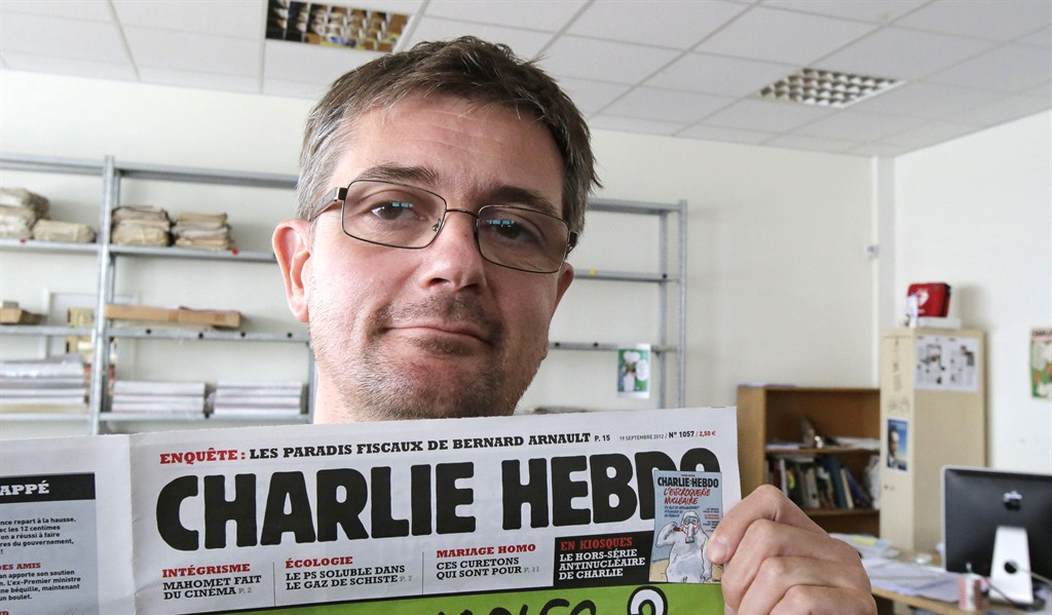January 7, 2015, was an ordinary day in Paris. At 11:30 AM, two French-born Algerian Muslim brothers, Saïd Kouachi and Chérif Kouachi, walked into the offices of the satirical magazine "Charlie Hebdo" and opened fire. They murdered 12 people and injured 11 others.
The brothers were mad at the magazine for publishing satirical cartoons of the Muslim prophet Mohammed. On the first issue after the attack, January 14, the cover featured a cartoon of Mohammed holding a sign saying in French, "All is forgiven."
That spirit of defiance wasn't lacking in the rest of the free world — at least for the moment. There was an initial burst of support for the "Charlie Hebdo" employees and the concept of press freedom that the two brothers were really attacking. A march in Paris on January 11 drew 2 million people, including Palestinian Authority President Mahmoud Abbas and Queen Rania and King Abdullah of Jordan. All carried signs saying, "I am Charlie."
But then, as Douglas Murray writing in The Free Press points out, something strange began to happen in newsrooms and at editorial desks around the free world. The "spirit of Charlie Hebdo" crumbled.
Supporters of the free press slightly mawkishly walked through the streets of Paris with pencils in their hands, as though this was any kind of stand. As I vividly recall Mark Steyn saying at the time, the best thing those demonstrators could have done was walk through the streets of Paris holding up the cartoons of Muhammad that the paper had run—which had caused repeated attacks on their offices even before 2015.
The best response from the press itself would have been to immediately publish a “blasphemous” Charlie Hebdo cartoon, in the spirit of “I am Spartacus.” You can’t take us all.
But even other “satirical” magazines like the UK’s Private Eye showed they didn’t have the courage of Charb and his colleagues. So many journalists and cartoonists in the West had become comfortable poking at empty hornets’ nests—the Episcopal Church, the UK’s royal family, snigger, snigger, tee-hee—that they had forgotten what it takes to poke a live one.
Indeed, deliberately provoking someone who might try to kill you for exercising your right to free expression is not easy. The good stuff, the important stuff, never is. The alphabet soup generations — X, Y, Z, and don't forget "me" — don't understand that. They expect the American military, or the police, or their parents to protect them.
Sometimes, exercising our freedom hurts. Sometimes, it's dangerous. (Ask Martin Luther King). Sometimes, it's unpopular.
And sometimes, it gets us killed. The "Charlie Hebdo" writers aren't alone. There have been seven U.S. journalists killed on the job in the U.S. in recent years, according to the U.S. Press Freedom Tracker. Several others have been murdered overseas.
What happened after the murders in Paris was disgraceful.
Then came the victim-blaming. The moment of solidarity evaporated as commentators on the left began to claim that Charlie Hebdo was asking for it. They claimed that the magazine was “right-wing” when it was anything but. They claimed its aim had been to provoke tensions in French society. They claimed the magazine was “punching down” by satirizing the inventor of Islam. Perhaps the murdered editors should have checked their privilege?
A lot of these commentators had probably never heard of Charlie Hebdo till the attack; they clearly knew nothing about the magazine’s anarchic brand of humor and fundamental Frenchness. In publishing cartoons of the prophet, Charb was simply practicing the liberté at the heart of the Republic, celebrating the French ideal of laïcité, or secularism. In short, the staff at Charlie Hebdo had always expressed their right as sons and daughters of France to say what they liked about religion, to treat all sacred values as being equally deserving of satire.
Charb, the alias of the "Charlie Hebdo" editor Stéphane Jean-Abel Michel Charbonnier, said in an interview before his death, "I'd rather die standing than live on my knees." The "Charlie Hebdo" offices had been firebombed in 2011, and numerous threats had been made against Charb and the staff.
How many of us would have paid the same price for simply exercising our God-given natural right to express our thoughts any way we chose?










Join the conversation as a VIP Member